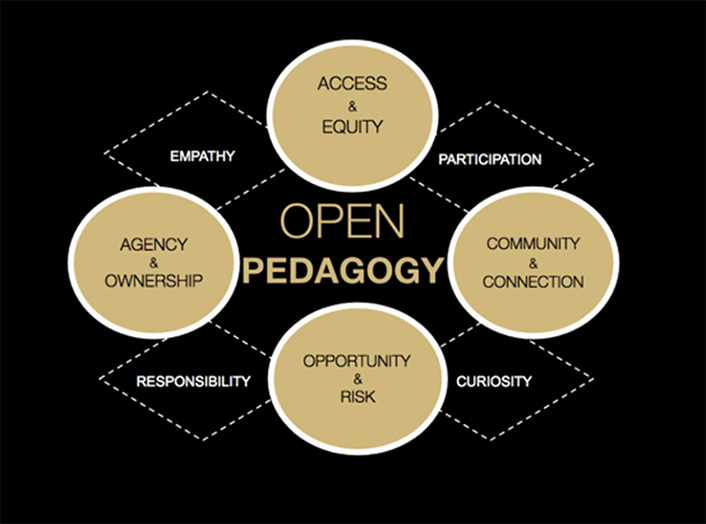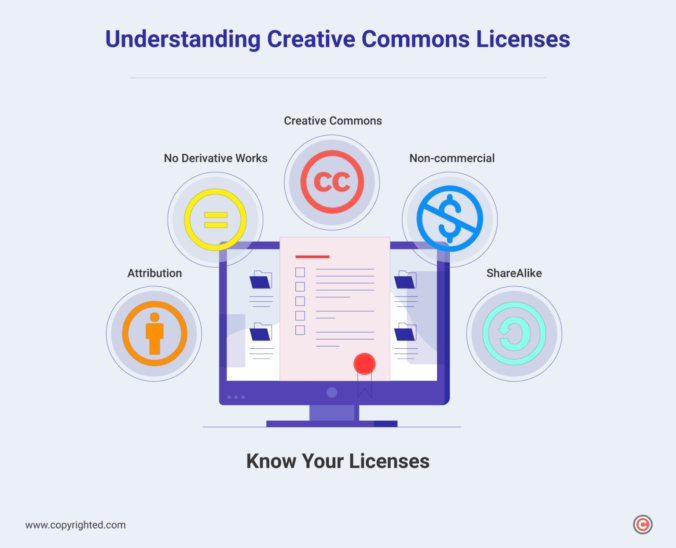
Moving Beyond Traditional Teaching
Open Pedagogy is an instruction method that embraces collaboration, openness, and sharing of resources to enrich learning. It shifts from traditional instructor-led methods to a more inclusive model that empowers students to take active roles in creating and sharing knowledge. It also empowers educators to modify learning materials that adapt to their course structures in creative ways. The following video about Open Pedagogy provides a great definition of the concept:
This video provides a brief understanding of the connection between Open Pedagogy and the core concepts in the title image of the blog. Essentially, Open Pedagogy allows learners and educators to:
- Reduce barriers to accessibility and equity
- Facilitate “connections across the boundaries of learning experiences, classrooms, campuses, countries, communities, and viewpoints.”
- Protect the ownership of an individual’s learning experiences by providing learners with great flexibility
- Incoporate tools to mediate the learning experience.
Transformation with Open Educational Resources (OER)
As illustrated in the video above, we cannot achieve Open Pedagogy without the incorporation of Open Educational Resources (OER). OER is freely acccesible educational materials that increases the accessibility and affordability of learning. Through OER, students can acxess quality educational materials without the high cost of textbooks.
For myself, I’ve benefitted immensely from using Open Textbook to learn courses I could not learn during my undergraduate studies at Uvic. When studying at Uvic, I had to worry about enrolment and tuition, and ensuring that all the courses I take contribute to my graduation requirements. This means that I may not be able to delve deeper into subjects I’m interested in but would not lead to my degree. Therefore, I’ve relied heavily on such open resources to learn about the topics of Marketing, Strategy, etc.
I’ve summarized the benefits of OER from my personal experience to the conccepts of OER in the following table:
| Your Experience | OER Concepts | Accessibility & Equity Insight |
|---|
| Learning Beyond Degree Requirements | Flexible Access to Knowledge | OER enables learners to explore diverse subjects without restrictions on enrollment or course limitations. |
| No Tuition or Enrollment Worries | Cost-Free Learning Resources | Open Textbooks and resources eliminate financial barriers, providing equitable access to education beyond formal costs. |
| Expanding Knowledge in Marketing, Strategy, etc. | Customizable Learning Paths | OER allows for personalized education, enabling learners to dive into topics that traditional programs may not cover. |
| Focus on Knowledge, Not Graduation Requirements | Learning for Knowledge’s Sake | With OER, students can prioritize curiosity and skill-building rather than course credits, making education more inclusive. |
| Reliance on Open Textbooks for Self-Learning | Democratization of High-Quality Resources | OER levels the playing field by making high-quality educational materials accessible, regardless of institutional access. |
Trends and Challenges in OER
While we’ve seen the benefits of OER, it is not to say that this initiative is without challenges:
- Infrastructural constraints: In many parts of the world, access to reliable internet and digital devices is limited. This digital divide is what makes it difficult for learners to fully benefit from OER (Nashipudi, 2017). To solve this challenge, we need to first address the issue of the digital divide.
- Language differences: OER matrerials often developed in major languages like English, which can create barriers for speakers of other languages (Pirkalainen et al., 2014). Natural language processing AI can be of great help in bridging this gap.
- Funding and sustainability: Without sustainable financial support or business model, OER initiatives, unless led by government agencies, may struggle to maintain quality (Stacey, 2010). Therefore, this should be the utmost important issue in the mind of policymakers. We also need to think about whether tax payers or foundations should be responsible for funding such initiatives (Stacey, 2010).
The following video about OER at Georgia State University discusses the challenges and potential best practices and policies to address these challenges:
Creative Commons Licensing and Responsible Sharing
CC Licensing is essential to the ethical use and sharing of OER. These license allow educators to confidently integrate resources while respecting the IP rights of their authors and creators. For example, in my blog, I applied the CC BY-NC license to original materials.
Most people may not be aware of what CC licensing entails. The image below helps you understand them better:

